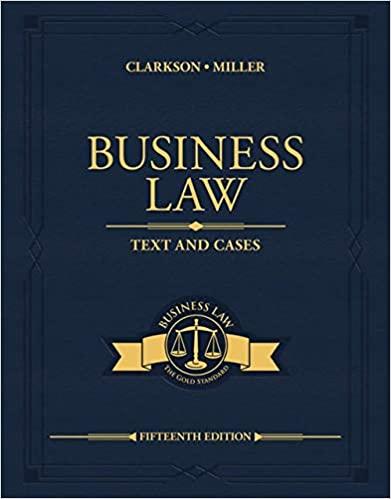Question
reply to this discussion: Davis v. Unites states, 512 U.S 452 (1994) Facts: On the Charleston navy base at the local pool hall( club) Robert
reply to this discussion:
Davis v. Unites states, 512 U.S 452 (1994) Facts: On the Charleston navy base at the local pool hall( club) Robert L. Davis won #30 wager and a game of pool against his opponent Keith Shackleton. After the pool game Shackleton refused to pay Davis the money Davis won from the match of pool. Later the next morning Shackleton was found beaten to death behind the navy base pool hall (club). Weapon of choice that had been narrowed down was Davis' pool cue he had been using the night before while they were shooting pool. Davis was brought in for questioning interviewed by the Navel investigation service at the NIs office on November 4th 1988. Investigators were told by various amount of people that Davis had been telling and admitting to beating Shackleton to death the blood stain on his pool cue was the proof. While during questioning Davis stated after an hour and a half that " maybe he should talk to a lawyer". The agents then clarified, are you wanting to speak to a lawyer, that when Davis replied "no I don't want a lawyer". As the interview went along and got more intense Davis stated " I'm not speaking another word with out ny laeyer". Davis was convicted of one count unpremeditated murder of Keith Shackleton which sentenced him of life in confinement along with dishonorable discharge from the navy special armed forces. Appeal : Davis argued that his right to counsel were violated during the interview by the NIS investigator. He stated that they continued to question him even after he stated " maybe I should speak to a lawyer". Appeal decision: Davis' appeal was over written due to Nis investigators stating that they appropriately clarified with Davis on his wishes when he stated maybe. He then stated no, I don't want to speak to a lawyer I don't need one so the questioning continued. Court decision: The Supreme Court said that investigators do not need to stop questioning an individual when the accused makes an ambiguous statement such as maybe i should speak to a lawyer. The court does not require investigators to adapt to this kind of behavior but it it can be easily detected that they are asking for counsel but just don't use exact wording then that should be respect if not it can be immunisible in court. Conclusion: Court appointed officials have a legal obligation to clarify when statements like these are made. The more clarification most of the time the better off the situation will be. Docket no. 92-1949 Argued on March 29th, 1994 Decided June 24 1994 Granted on November 1st 1993 Lower courts: the United stated court of appeals for the armed forces.
Step by Step Solution
There are 3 Steps involved in it
Step: 1

Get Instant Access to Expert-Tailored Solutions
See step-by-step solutions with expert insights and AI powered tools for academic success
Step: 2

Step: 3

Ace Your Homework with AI
Get the answers you need in no time with our AI-driven, step-by-step assistance
Get Started


